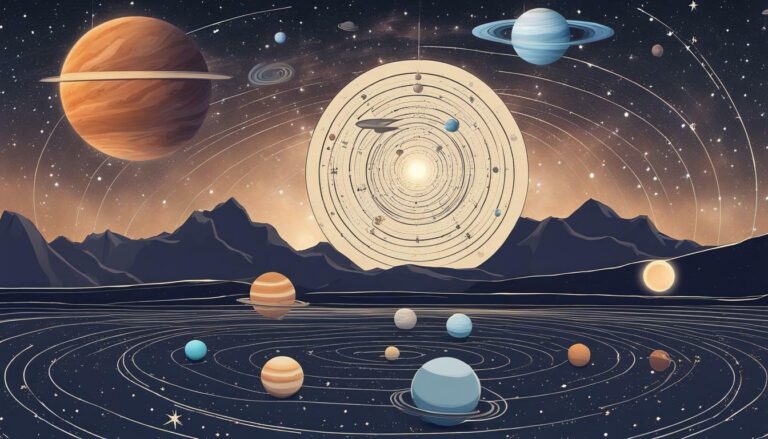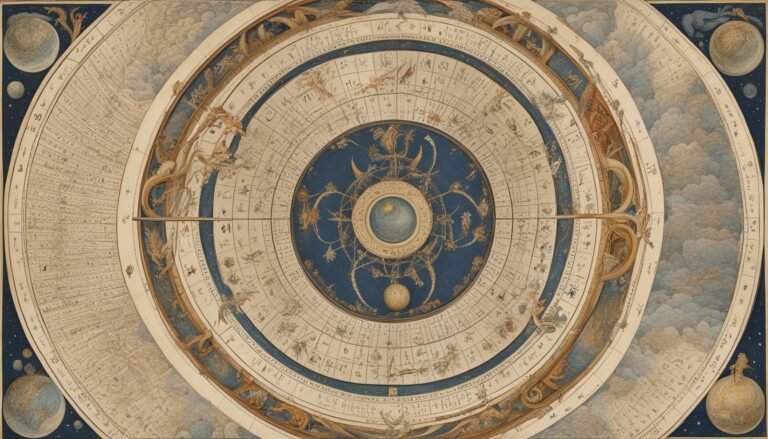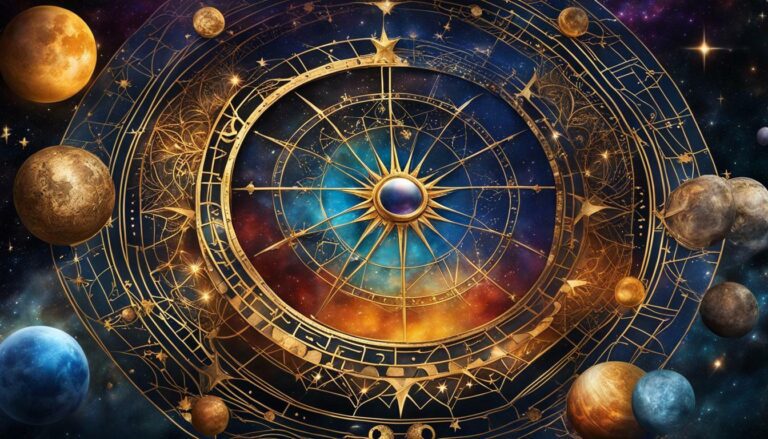When Did Astrology Originate? Unraveling the Starry History
Astrology has been a fascination for humanity for centuries. The idea that the position of the stars and planets can influence our lives has captured the imagination of people across cultures and time. Understanding astrology’s roots and the circumstances that led to its development can provide a deeper appreciation for its significance and enduring popularity.
In this article, we’ll explore astrology’s history, from its origins in ancient civilizations to its current status and controversies surrounding it. We’ll also examine how astrology has influenced various aspects of culture and society and potential developments for this ancient practice in the future.
Key Takeaways:
- Astrology has been a source of fascination for centuries, with its popularity enduring to the present day.
- Understanding the historical roots of astrology can provide insight into its significance and relevance across cultures and time.
- In this article, we’ll explore astrology’s history, controversies, cultural impact, and future developments.
The Ancient Beginnings of Astrology
Astrology has been around for thousands of years, with its roots stretching back to ancient civilizations such as Mesopotamia, Egypt, and China. In these early societies, astrology was closely intertwined with astronomy, as the observation of celestial bodies was essential to both practices.
The earliest known records of astrology date back to the 2nd millennium BCE in Mesopotamia, where astrologers interpreted celestial omens as signs from the gods. In Egypt, astrology was similarly linked to religious beliefs and was used to predict the flooding of the Nile River. In China, astrology played a role in the development of the Chinese calendar and was used to determine the most auspicious dates for important events.
As astrology spread to ancient Greece and Rome, it underwent significant development and refinement. Greek astrologers like Ptolemy contributed to the inception of astrology as a systematic and organized field of study. They developed a system of astrological symbols, such as the zodiac, that are still used today. During the Roman Empire, astrology was strongly associated with the state religion and was used to predict the fate of emperors and political events.
The Contributions of Ptolemy
Ptolemy, an ancient Greek astronomer and astrologer, made significant contributions to the development of astrology. He wrote the influential “Tetrabiblos,” a treatise on astrology that laid out the fundamental principles of the field. Ptolemy’s work was influential for centuries and was translated into Arabic during the Islamic Golden Age, where it had a significant impact on the development of Arabic astrology.
Overall, astrology’s historical roots are complex and multifaceted, with its development closely tied to the beliefs and practices of ancient civilizations. Understanding the origins of astrology is essential to appreciating its enduring popularity and its ongoing relevance in contemporary society.
Astrology in Classical Times
The development of astrology continued through the classical era, particularly in the ancient Greek and Roman civilizations. It was during this period that astrology began to take shape as a formal practice and was refined into a more sophisticated system.
Aristotle, the famous ancient Greek philosopher, was one of the first to study astrology systematically. He believed that celestial bodies had a direct impact on human affairs and that the movements of these bodies could be used to understand and predict events on Earth.
However, it was Claudius Ptolemy, a Roman astronomer and astrologer, who is most credited with formalizing astrology as a practice. Ptolemy’s works, including the Almagest and the Tetrabiblos, were widely influential in the ancient world and helped to spread the practice of astrology throughout Europe and Asia Minor.
Astrology in Ancient Greece
Astrology was particularly popular in ancient Greece, where it was intertwined with mythology and philosophy. Many famous Greek philosophers, including Plato and Hippocrates, believed in the power of astrology and its ability to explain human behavior and predict future events.
One of the most notable figures in Greek astrology was the mathematician and astronomer, Hipparchus. He is credited with developing the earliest known horoscope, which was based on the positions of the planets at the time of a person’s birth.
During this time, astrology began to be used in practical ways, such as for predicting weather patterns and the outcomes of battles. It was also used as a tool for medical diagnosis and treatment, as certain herbal remedies and treatment methods were believed to be more effective based on the position of the stars and planets.
The Influence of Rome
During the height of the Roman Empire, astrology continued to gain in popularity and influence. Emperor Augustus was a strong believer in astrology and used it to make important political decisions.
It was also during this time that the zodiac signs and constellations we are familiar with today were first documented. The twelve signs of the zodiac, including Aries, Taurus, and Gemini, were believed to reflect the different personality traits and characteristics of individuals born under each sign.
Overall, the classical era helped to establish astrology as a legitimate and respected practice, paving the way for its continued development in the centuries that followed.
Astrology in the Middle Ages
During the Middle Ages, astrology continued to play an important role in European society, despite criticism from religious leaders who viewed it as a form of pagan worship. Many influential figures, including kings and popes, consulted astrologers for advice on matters such as warfare, disease, and agriculture.
One notable influence on medieval astrology was the work of Arab and Persian scholars who preserved and translated ancient astrological texts. Islamic scholars made significant advancements in the field of astrology, including the introduction of Arabic parts and the refinement of horary astrology.
The 12th century saw the rise of the influential astrologer Guido Bonatti, whose work focused on predicting the outcomes of battles and political events. Bonatti’s writings on astrology were highly regarded by his contemporaries and continue to be studied today.
Despite its popularity, astrology faced criticism from some quarters during the Middle Ages. Religious leaders such as Saint Thomas Aquinas condemned the practice, viewing it as an affront to Christian beliefs. However, many practitioners continued to practice astrology and develop new techniques throughout the medieval period.
Renaissance and Astrological Revival
The Renaissance period marked a significant resurgence of interest in astrology. This was a time when the study of astronomy and astrology was once again considered a respectable pursuit, with notable figures like Johannes Kepler making significant contributions to the field.
During this period, horoscopes became a popular form of astrological practice. These were personalized predictions based on an individual’s birth chart, which was calculated based on their exact time and location of birth. Horoscopes were often read in conjunction with other astrological techniques, such as the study of planetary movements and astrological transits.
Kepler’s Contributions to Astrology
Johannes Kepler, a German mathematician and astronomer, is considered one of the preeminent figures in the Renaissance revival of astrology. He played a crucial role in bridging the gap between astronomy and astrology, developing new techniques for calculating planetary positions and using these to create more accurate horoscopes.
Kepler’s contributions to astrology were not limited to the technical aspects of the field. He was also a prolific writer on the subject, producing works such as “De Fundamentis Astrologiae Certioribus” and “Tertius Interveniens”. In these writings, Kepler argued that astrology was a legitimate field of study and that the positions of the planets had a direct influence on human affairs.
The Emergence of Astrological Almanacs
Another important development during the Renaissance was the emergence of astrological almanacs. These were annual publications that contained astrological predictions for the coming year, as well as other information related to the movements of the planets and stars.
One of the most famous astrological almanacs of the period was “The Merlini Anglici Ephemeris”, which was produced by the English astrologer William Lilly. This almanac became incredibly popular and was widely read throughout Europe, cementing astrology’s continuing relevance in the early modern period.
The Modern Era of Astrology
As society evolved, so did astrology. The modern era brought new developments in the field, including the emergence of psychological astrology and the integration of astrology into popular culture.
In the early 20th century, Swiss psychiatrist Carl Jung introduced the concept of psychological astrology, which focused on the individual’s internal experience and personal growth rather than simply predicting events in their life. This approach became increasingly popular throughout the 20th century, as people sought a more introspective and spiritual understanding of themselves and their place in the world.
As technology advanced, so did the accessibility of astrological information. The rise of the internet made it possible for people to access astrological readings and information online, reaching a wider audience than ever before. This has led to the emergence of new branches of astrology, including electronic astrology, which incorporates technology and artificial intelligence into astrological practice.
Astrology has also become a prevalent aspect of popular culture. Horoscopes have become a common feature in magazines, newspapers, and online publications, and astrology-themed books, movies, and TV shows have gained a large following. This has helped to normalize and popularize astrology to a wider audience, making it more accessible and less stigmatized.
While some may dismiss astrology as a pseudoscience, its ongoing relevance in contemporary society cannot be denied. From personal growth to decision making, astrology continues to provide guidance and insight for many individuals.
Astrology Today
Astrology remains a widely popular practice in contemporary society, with millions of people around the world turning to astrological readings for guidance and insight. Many people, especially millennials and Gen Z, use astrology as a tool for self-discovery and personal growth.
There are various branches of astrology, including natal astrology, horary astrology, and electional astrology, among others. Each branch has its own set of techniques and principles, catering to different needs and interests.
Astrology is also prevalent in different cultures all over the world, with varying interpretations and practices. In India, for example, astrology is deeply ingrained in Hindu culture, with astrology being consulted before important life events such as marriages and childbirth. In Chinese culture, astrological readings are based on the lunar calendar and are used to predict a person’s personality traits and fortunes.
Astrology’s Influence on Culture
Astrology has had a profound impact on various aspects of culture throughout history. From art to literature, astrology has been a source of inspiration for many creative minds. Additionally, astrology has played a role in shaping political decisions and historical events.
One notable example of astrology’s influence on culture is the inclusion of astrological symbolism in Renaissance art. Artists such as Leonardo da Vinci and Michelangelo incorporated astrological motifs into their works, reflecting the fascination with astrology during this period.
Literature has also been influenced by astrology with references to zodiac signs and celestial bodies appearing in many classic works. Shakespeare, for instance, was known to use astrology in his plays to add depth and meaning to his characters.
“The fault, dear Brutus, is not in our stars, but in ourselves.” – William Shakespeare, Julius Caesar
Astrology has also played a role in political decision-making. In the 17th century, French astrologer Nostradamus was purportedly consulted by Catherine de’ Medici for insight on political matters. Similarly, Ronald Reagan was known to have consulted an astrologer for guidance during his presidency.
Overall, astrology’s influence on culture is undeniable, and its impact can be seen in various forms of artistic expression and societal decision-making.
Controversies and Debates Surrounding Astrology
Astrology has been a subject of controversy and debate throughout much of its history. Some people believe in its validity and consider it a useful tool for self-discovery, while others dismiss it as a pseudo-science with no scientific basis.
Skeptics argue that astrology’s claims are not supported by empirical evidence and that any perceived accuracy is due to chance or confirmation bias. They also point out that astrology’s assertions often contradict established scientific knowledge, such as the lack of evidence for the influence of celestial bodies on human affairs.
Another area of concern is the ethical implications of astrology. Critics argue that astrological advice can be harmful if it influences important life decisions, such as marriage, career choices, or medical treatment, without adequate scientific or rational justification.
Despite these criticisms, astrology continues to attract followers and practitioners around the world. Some astrologers argue that astrology is a valid and meaningful approach to understanding and navigating human life, while others acknowledge its limitations and suggest that it should be approached with an open mind and a critical eye.
Historical Perspectives on Astrology Debates
The debates over astrology’s validity are by no means new. In fact, throughout much of its history, astrology has been a subject of intense philosophical, scientific, and religious scrutiny.
During the Enlightenment era, for example, astrology was often dismissed as superstitious and unscientific. The famous philosopher Immanuel Kant famously declared that astrology was no more than “a kind of charlatanism,” while the astronomer Pierre-Simon Laplace famously remarked that astrology was “a chimerical science which has no validity whatsoever.”
Despite these criticisms, astrology continued to thrive, and today, it remains a popular and influential practice for many people around the world. Whether astrology is a valid source of insight or a mere delusion is a matter of ongoing debate and controversy.
Astrology’s Future and Evolution
Astrology has a long and fascinating history, but what does the future hold for this ancient practice? One of the most significant shifts in recent years is the integration of technology into astrology. Online horoscopes and astrology apps are now widely available, making it easier than ever before to access astrological information.
As society continues to evolve, astrology will undoubtedly adapt and change with the times. Some experts predict that astrology will continue to gain mainstream acceptance, particularly as more people seek out holistic approaches to wellness and spirituality. Others suggest that astrology may integrate with other fields, such as psychology or neuroscience, to provide new insights and applications.
New Developments and Trends
In recent years, there has been a growing interest in niche areas of astrology, such as financial astrology, medical astrology, and even pet astrology. With the increasing availability of online resources and specialized astrological techniques, it’s possible that these areas will continue to gain popularity and evolve in new directions.
There is also a renewed focus on decolonizing astrology, which involves exploring and dismantling the Eurocentric biases that have historically shaped astrological interpretation. This shift towards inclusivity and cultural sensitivity is likely to impact how astrology is practiced and understood in the years to come.
The Future of Astrology
Despite the many changes and challenges facing astrology, it seems likely that this ancient practice will continue to endure. As people seek greater understanding and meaning in their lives, astrology offers a way to connect with something larger than oneself and to gain insights into the mysteries of the universe.
The future of astrology may involve new discoveries, new applications, and even new controversies. But whatever the future holds, it’s clear that astrology will continue to fascinate, inspire, and captivate people for generations to come.
Astrology’s Future and Evolution
As with any field of study, astrology is constantly evolving and adapting to changing societal and cultural shifts. The future of astrology is heavily influenced by technological advancements, as well as the growing interest and acceptance of this ancient practice in mainstream culture.
One potential area of growth for astrology is in the field of personalized horoscopes and readings. With the aid of artificial intelligence and machine learning, astrologers and enthusiasts alike are able to create more accurate and specific horoscopes tailored to individual needs and preferences.
Furthermore, astrology is likely to continue expanding its reach and influence beyond its traditional Western origins. In recent years, there has been a growing interest in Eastern forms of astrology, such as Vedic and Chinese astrology, which offer unique perspectives and techniques for understanding the celestial movements.
However, as with any field, astrology is not without its challenges and controversies. Skepticism and scientific criticism remain prominent, while ethical concerns surrounding the commercialization and commodification of astrology continue to be debated.
Despite these challenges, astrology’s enduring fascination and widespread popularity suggest that it will continue to flourish and evolve for generations to come.
FAQ
Q: When did astrology originate? A: Unraveling the Starry History.
Introduce the main topic of the article, which is the origin and history of astrology. Explain the significance of understanding the origins of astrology to gain a deeper appreciation for this ancient practice.
Q: The Ancient Beginnings of Astrology. A: Astrology’s Historical Roots.
Discuss the earliest known records of astrology and its beginnings in ancient civilizations such as Mesopotamia, Egypt, and China. Explain how astrology was closely intertwined with astronomy and the observation of celestial bodies.
Q: Astrology in Classical Times. A: Astrology’s Inception.
Explore the development of astrology in ancient Greece and Rome. Discuss the contributions of notable figures such as Ptolemy and the refinement of astrological techniques during this period.
Q: Astrology in the Middle Ages. A: History of Astrology.
Discuss the role of astrology during the Middle Ages, particularly in Europe. Highlight the influence of Arab and Persian scholars in preserving and translating astrological works from ancient times.
Q: Renaissance and Astrological Revival. A: Astrology’s Historical Roots.
Explore the revival of astrology during the Renaissance period. Discuss the influence of figures like Johannes Kepler and the emergence of horoscopes as a popular form of astrological practice.
Q: The Modern Era of Astrology. A: Astrology’s Origins.
Trace the development of astrology in the modern era, including the rise of psychological astrology and the integration of astrology into popular culture. Discuss the impact of technological advancements on the accessibility of astrological information.
Q: Astrology Today. A: When did astrology begin?
Provide an overview of astrology’s current status and popularity. Discuss the different branches of astrology and its ongoing relevance in various cultures around the world.
Q: Astrology’s Influence on Culture. A: History of Astrology.
Explore how astrology has influenced various aspects of culture, including art, literature, and even political decisions. Discuss notable instances of astrology’s impact on society.
Q: Controversies and Debates Surrounding Astrology. A: History of Astrology.
Address some of the controversies and debates surrounding astrology, including skepticism, scientific criticism, and ethical concerns. Present different viewpoints and arguments on the validity of astrology.
Q: Astrology’s Future and Evolution. A: Astrology’s Inception.
Discuss the future of astrology and potential developments in the field. Explore how astrology may continue to evolve and adapt to societal changes and scientific advancements.





